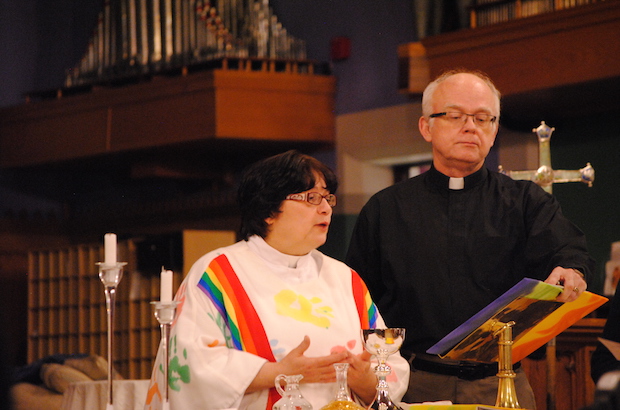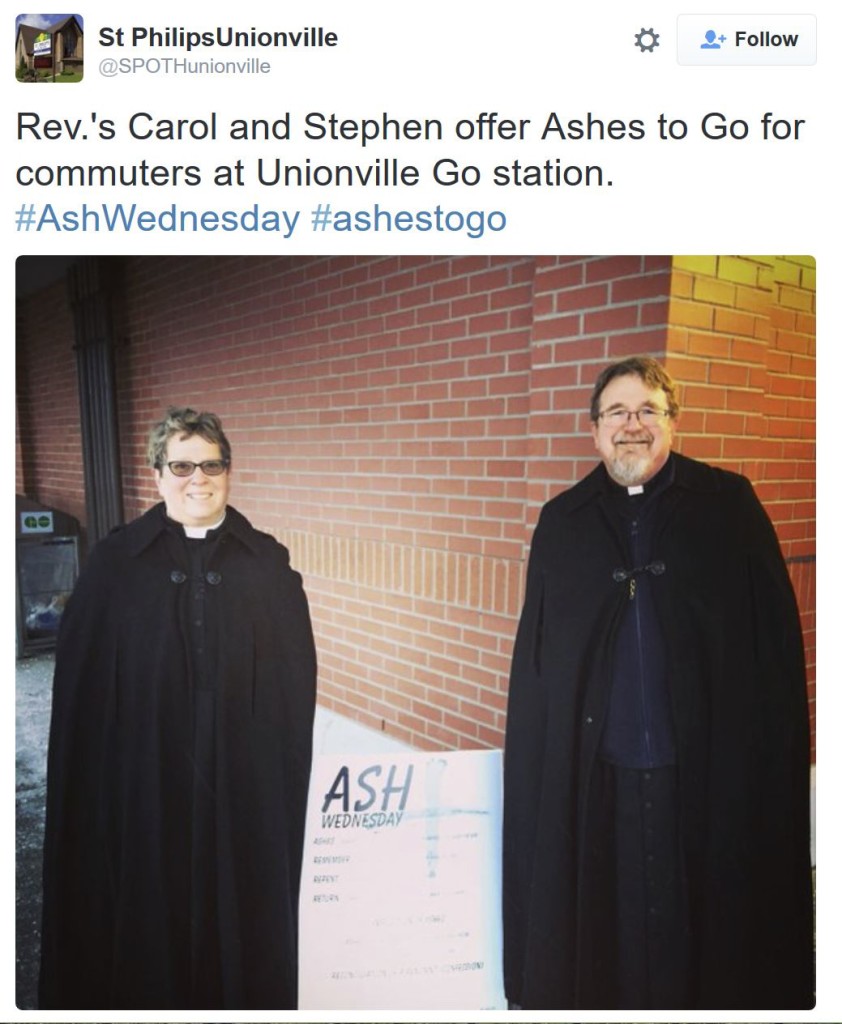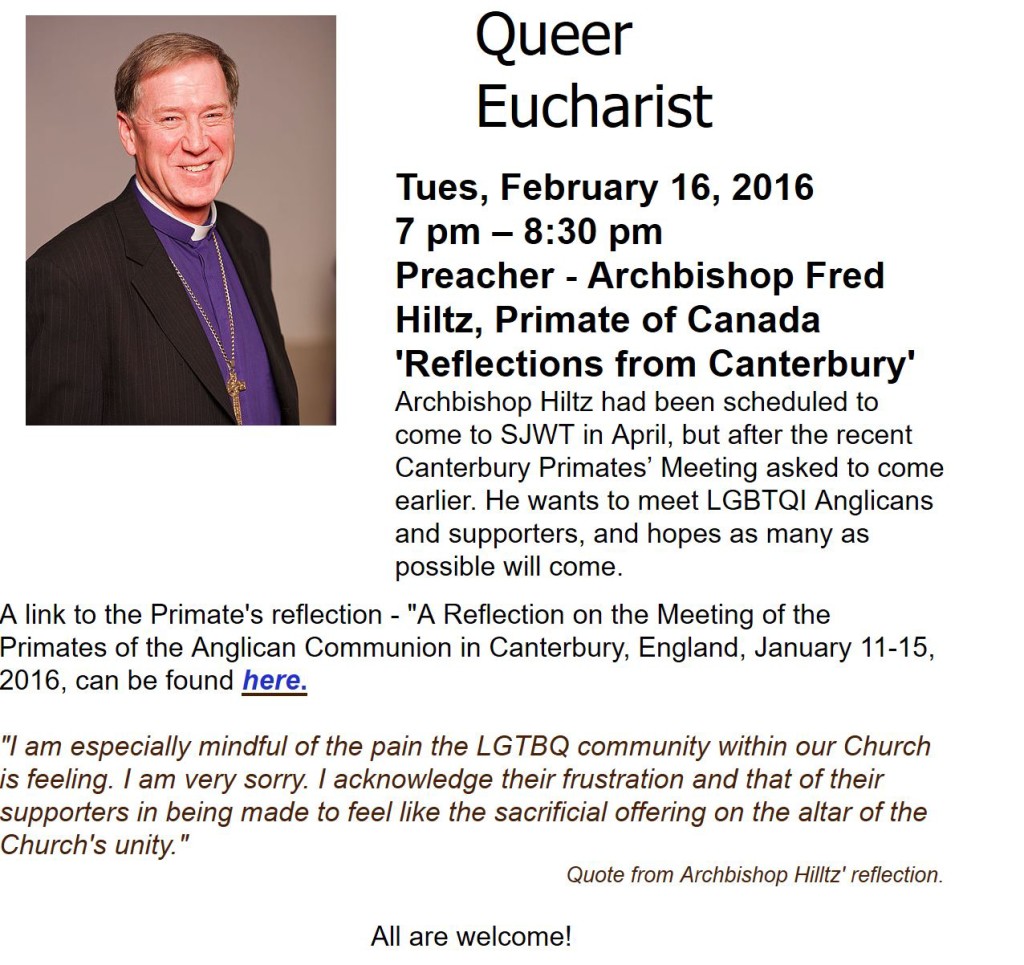Ever since I returned from Canterbury, arriving home Monday, January 18, I have been praying about and wanting to share with all of you in the Diocese a bit more information and some further reflections.
My main goal is to thank all of you for your incredible prayer for the Primates, their families and the Provinces they each represented, and for all of us who were involved in these historic meetings. It was obvious to all that there was an incredible blanket of prayer covering all aspects of our time. Having that certainty in the midst of the times of tension and worry provided the rock solid conviction that the Lord Jesus was in charge, that he was hearing prayer, and that he was working to build his church.
It was quite a week. Thank you for praying!
The first thing that I want to say is that the week, January 11 to 16, was truly an extraordinary time. Expectations for this meeting hosted by the Archbishop of Canterbury at the Canterbury Cathedral, where all the primates stayed at the Canterbury Lodge, were through the roof.
Before heading to Canterbury, a friend and fellow bishop who loves history suggested that these meetings might be the most significant since the Council of Whitby – which was quite a while ago (664 AD). The future of the Anglican Communion, if there is to be one, seemed in everyone’s mind to be at stake. Would all the primates remain throughout the week? Would some walk? And if so who? And then for us in the ACNA there was the added excitement and anticipation that our own Primate, Archbishop Foley Beach, was a member of this gathering and we wondered what that would mean for him and for our future.
I was fortunate to be invited to be part of a small advisory team that traveled to Canterbury and stayed there throughout the meetings. We were available to pray, to serve in any way needed, to provide research and background information, and, later, to be available to the media.
In summary, I would say that the week was as spiritually challenging and charged and as much of an emotional roller coaster as any I can remember. For this reason I cannot thank you enough for all your prayer.
Was it a success? Yes! Because God is faithful.
People ask me, bottom line, was it a success or not? Does the fact that Canada was not mentioned in the one action of discipline mean it was a failure for us in Canada?
I don’t think anyone knew what to expect going in, but it is clear that what happened and how it unfolded was completely different from what anyone would have predicted.
It was the GAFCON Primates’ goal and prayer that this meeting would focus on restoring good order and reviving the Anglican Communion in line with the clear teaching of the Bible. Evidence that order was being restored would require suspension of the US Episcopal Church (TEC) and the Anglican Church of Canada (ACoC) at least until there was repentance and evidence of a change.
What did happen was that the gathering addressed the very narrow issue of TEC and its change of liturgies and the marriage Canon at its most recent General Convention last summer. The decision to discipline TEC finally came to a vote on Thursday. Archbishop Foley has made it clear that, while he chose not to participate in that vote, it was passed by a very large majority. After that, with TEC and the ACoC Primates still fully participating, he and some of the GAFCON Primates absented themselves from the remaining day of the meeting. They felt they could only continue if there was evidence that the Communion was being brought back into Biblical order. The fact that the ACoC was undisciplined and TEC was disciplined in a minor way but was still at the table made it necessary for the GAFCON Primates to leave.
Was this gathering a success? By faith, I say “yes”; in the purposes of God they were a success and, in years to come, will be seen to be significant. I can say this because I believe that God answers prayer and I’m confident that our own Archbishop Foley along with our partners in the Gospel, the other GAFCON and Global South Primates, were walking in obedience to God. But the proof of that success, the outcome of what has begun to unfold, is yet to be seen and needs to be prayed into reality.
What I want to share now are some reasons why I think we can thank God for what he has done and is doing, and ask you to commit yourself to pray these beginnings into being, fully expressed for the purposes and glory of God.
Tip of the Tip of the Iceberg
Those of us who have been living through what’s known as the realignment of Anglicanism – which incidentally began June 15, 2002 in Vancouver – are familiar with the image of the iceberg. What you see above the waterline though it may be immense is actually less than 1/8 of the complete iceberg; 7/8 of the iceberg looms below the surface. It is a big mistake to assume that the visible ice is all there is.
As Archbishop Foley said in his statement what happened at these meetings was only a beginning. But it IS a beginning, for which we can thank God.
As to the issue of discipline, although one could argue that the scope was far too narrow and the discipline far too weak and that others, including the ACoC should have been included, nevertheless this small step of discipline WAS taken. What was done was a good beginning. (While the ACoC, as a whole, has not yet officially changed its liturgy and marriage canon, 11 ACoC dioceses allow the blessing of same-sex unions and this summer its General Synod will consider same-sex marriage.)
Yes, it’s the tip of the tip of the iceberg but it does say that no Province can simply make up its own mind on doctrine and practice when it is in conflict with the Bible and clear Anglican doctrine and continue in the Communion without being disciplined. This small step of discipline is immense in its implications as a beginning, but it is just the tip of the tip of the iceberg.
It only takes a spark to get a fire going
Perhaps some of our older members might recognize the above line from a chorus that some of us sang many years ago. I think it’s pertinent to our discussion here because it’s my belief that the presence of our Primate in those gatherings, welcomed to take his place with fellow primates and participate fully as long as he chose to stay, was a spark which potentially has begun a glorious work of God.
When Archbishop Foley gave his brief report on the Anglican Church in North America, he was speaking as the second Primate of our Province, a Province that has been thriving and growing since 2009. He was not reporting on what we might do or would like to do, but he was reporting on what had already happened. He was speaking as one who could give evidence of life in our Province in all sorts of ways including a thoroughgoing commitment to be truly Biblical and truly Anglican. One small evidence of this life is our new Catechism which Archbishop Foley gave to each Primate at the meeting. This Catechism has already been translated into a number of languages and has been well received throughout the Communion.
Just as Elijah built the altar but it was God who had to send the fire, so I suggest the presence of our Primate at that gathering allowed God to ignite a spark of witness which was profound. We may see the implications for many years to come.
By his presence, Archbishop Foley was a very visible sign of the work of GAFCON, because the Anglican Church in North America came into existence as a result of the first GAFCON gathering in Jerusalem (2008), which called for its formation.
I don’t think I understood before this Primates’ gathering how powerful a witness it would be for Archbishop Foley to be a participant. Remember, more than 50 per cent of the Primates present had never been to a Primates’ meeting before. For them to have Archbishop Foley there so they could observe the man of God he is, the humble way he took his place at the meeting, and the anointing of the Lord on his life, it truly must have been a powerful witness, especially to Primates who were unfamiliar with the history of the crisis in the Communion. I believe he, together with the other GAFCON and Global South Primates, had a strong impact and brought a powerful witness.
I believe the scope, strength and breadth of the GAFCON movement has been strengthened and expanded as a result of these meetings. A spark has been lit. Let’s pray that it becomes a roaring fire of Biblical Anglicanism seeking to bring the Gospel to a needy world which God loves.
Principled Approach (Living it out in the middle of the battle)
I believe our Primate and our GAFCON friends who were all at these historic meetings operated according to principle. They came because they were invited. Although they might have feared it would be a waste of time or, worse, that they might be trapped into something or maneuvered into appearing to say things they didn’t want to say, nevertheless, with all those risks in mind, they came believing that God wanted them to attend, at least for the beginning.
What was clear was that they all came because they were believing God and praying for the restoration of good order and for revival in the Anglican Communion according to the Bible. If that were to happen, as Anglicans, we rightly would be eager to participate in such a global movement and we would all be strengthened by our participation together.
This all depended however on there being good order, which meant there had to be discipline, or we would have no desire or ability to participate. The concept of the Communion devolving into a loose federation was of no interest to the Anglican Church in North America or the other GAFCON Primates.
I believe the GAFCON Primates stayed in the meeting as long as they did because they recognized that discipline was at least being discussed, and as long as that was on the table it was possible for our Primate and the other GAFCON Primates to remain. (Archbishop Ntagali left the meeting late on Tuesday as his Province had committed to participating in Communion meetings only if the ACoC and TEC were disciplined and no longer present. When his motion to have the ACoC and TEC voluntarily withdraw failed, he felt his duty to his Province required him to leave the meeting.)
Under immense pressure and knowing that every step they took or didn’t take was going to be dissected and analyzed, and at times misconstrued, the GAFCON Primates continued to walk faithfully and to take their place until it was no longer possible according to the principle with which they began these meetings.
Thus Thursday evening our Primate and the GAFCON Primates of the largest Provinces left and so were not present on Friday to vote on the final Communique or the election of the Standing Committee. |
All these steps taken, including the decision of Archbishop Foley to not vote on the discipline motion although he was given a ballot, were taken as faithful applications of wise principle.
Pray and press on
I truly believe that the outcome of these meetings does have an impact on the life of those of us “on the ground” and therefore it was right and proper for us to be intensely engaged in praying through every part of these meetings.
But having said that, we must remember that what was at stake at those meetings was NOT whether the Gospel is true, whether it’s the power of God for salvation to everyone who believes, whether the Bible is the true and authoritative word of God, and whether Jesus is the only way to God. These things remain established Anglican doctrine regardless of what happens in a series of meetings.
What may be at stake however is whether the Anglican Communion, as a movement, will be strengthened to be a growing force for the Gospel in the days ahead.
It reminds me of Mordecai’s words to Esther when he was challenging her to intervene on behalf of the people of God. He made it clear that what was at stake was not IF God would raise up a protector for His people, but whether or not Esther would play a part in God’s plan or whether He would achieve His purposes another way.
Then Mordecai told them to reply to Esther, “Do not think to yourself that in the king’s palace you will escape any more than all the other Jews. For if you keep silent at this time, relief and deliverance will rise for the Jews from another place, but you and your father’s house will perish. And who knows whether you have not come to the kingdom for such a time as this?” Esther 4:13-14
It may be that, for such a time as this, in the purposes of God, he would want to use the Anglican Communion in an ever increasing and more powerful way for the cause of the Gospel. Meetings like the one that just happened in Canterbury, and the outcome of those meetings, will perhaps determine whether or not this is the case.
And so friends in the Anglican Network in Canada this is a renewed call to prayer. Pray that this will be a beginning; that God will do a great work of restoring and reviving and then using for his purposes this thing called the Anglican Communion. Pray too that God will renew, restore and revive us in ANiC. And as we pray, let us recognize the importance of the task which God has given us to “build Biblically faithful, gospel-sharing Anglican churches” and zealously focus on the five priorities which we are praying will become a transformational reality in every ANiC congregation, more and more.
So dear friends, thank you for your prayers.
Now let’s turn our hearts to even more prayer and “forgetting what lies behind and straining forward to what lies ahead,” let us “press on toward the goal for the prize of the upward call of God in Christ Jesus”. (Philippians 3:13b – 14)
Every Blessing!
+Charlie
The Rt Rev Charles F Masters
Diocesan Bishop
Anglican Network in Canada
Box 1013, Burlington, ON L7R 4L8


 Canada’s largest Protestant church targeted three Israeli companies with operations in Jewish settlements for economic sanctions and boycott.
Canada’s largest Protestant church targeted three Israeli companies with operations in Jewish settlements for economic sanctions and boycott. The chief executive of SodaStream International Ltd. says he has been forced to lay off hundreds of Palestinian workers after a factory was targeted by an international boycott movement and moved from the West Bank into Israel.
The chief executive of SodaStream International Ltd. says he has been forced to lay off hundreds of Palestinian workers after a factory was targeted by an international boycott movement and moved from the West Bank into Israel. On a January evening in Toronto, a dozen or so congregants filter in from the cold into the surprising mauve, green and yellow interior of a stately old church in a leafy west-end neighbourhood.
On a January evening in Toronto, a dozen or so congregants filter in from the cold into the surprising mauve, green and yellow interior of a stately old church in a leafy west-end neighbourhood.
